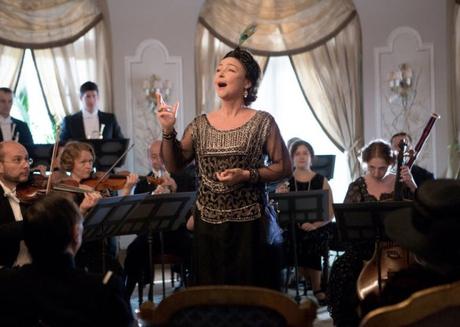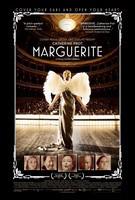In French director Xavier Giannoli’s pitch-perfect comedy of manners, “Marguerite,” a shameless chanteuse with a surplus of money and a shortage of talent buys her way into the spotlight, exposing the hypocrisy of her unctuous social circle in the process. Inspired by screechy American soprano Florence Foster Jenkins — the selfsame person embodied by Meryl Streep in Stephen Frears biopic.
In the decades since her death (tellingly, one month after a career-ending 1944 concert at Carnegie Hall), Marguerite’s real-life model Florence Foster Jenkins hasn’t been so fortunate: Jenkins’ notoriously horrendous voice lives on today in the form of novelty records.
TRAILER OF “MARGUERITE”
One month before the shooting of Marguerite, French writer-director Xavier Giannoli heard about this rival Hollywood film project about the new film by Stephen Frears starring Meryl Streep in the title role, about a real-life American socialite Florence Foster Jenkins, who is is also the subject of his own film.
When Giannoli first came across Jenkins’s story, a unique tale of a woman, living in the 1920s, obsessed with singing opera, who, unbeknown to her was a terrible soprano – tone deaf, unable to keep pitch or rhythm. Yet, singing in small salons or recital halls, she became popular among audiences who found her outpourings amusing.
Giannoli transplanted Jenkins’s story to Paris, turning her into the hugely delusional Marguerite Dumont (played by Catherine Frot), a woman surrounded by sycophants. While Giannoli’s Marguerite is a film formed under dark clouds, Frears’s version Florence Foster Jenkins has a more comedic twist.
Cold-shouldered by a husband who sees her as “a freak”, Marguerite is embraced by opportunists and anarchists who hear in her voice the sound of someone trying to “exorcise an inner demon” – a review she takes as a compliment. An elaborate conspiracy to protect Marguerite from the reality of her situation results in a series of rehearsals for a grand public performance involving a deaf pianist, a bearded-lady soothsayer, and a blackmailed singing tutor, but Frot ensures that Marguerite is never the butt of the joke.

The story begins in 1921 with a performance by Marguerite in her mansion to benefit war orphans. Giannoli sets the scene by following the arrival of a nervous young music student at the Dumont estate. The unsuspecting girl has been hired to sing a duet at a benefit for war orphans hosted by Marguerite herself, where this enigmatic aristocratic (who fussily prepares herself upstairs and offcamera) will be the main attraction. Meanwhile, determined to hear her voice for themselves, two young men — one a journalist (Sylvain Dieuaide), the other a self-styled anarchist (Aubert Fenoy) — scale the wall and sneak into the recital.
Like Jenkins, Marguerite restricts her concerts to a by-invitation-only audience of sycophantic acquaintances, who offer nothing but compliments to her face, while whispering insults behind her back. As the anticipation mounts, her husband (Andre Marcon) invents an excuse not to attend by faking the breakdown of his gorgeous Sima-Standard automobile, clearly determined to avoid the embarrassment — a view counterbalanced by Marguerite’s over-protective butler, Madelbos (Denis Mpunga), who personally encourages her fantasy, even going so far as to photograph his employer in campy secondhand opera costumes.
While the theater audience can’t help but chuckle, the assembled guests are held prisoner
The day after her war-orphan debacle, Marguerite is overwhelmed by a double-edged “rave” in the party-crashing reporter’s paper and a parlor full of white flowers from her “admirers.” (Like the elegant lady that she is, Marguerite favors all things alabaster, giving the film its tony, almost-monochrome aesthetic.) She opts to take these tokens at face value, though Giannoli deliciously implies that they are not what they seem: Madelbos discreetly clips the crueler reviews from the Paris broadsheets so Marguerite won’t see them, exchanging knowing looks with the baron that suggest he was the one to have ordered the flowers.
While “Marguerite” is first and foremost the fable of a woman so smitten with music (and later, by the thrill of an audience) that she feels compelled to practice it well beyond the all-too-evident limits of her own ability. The film also explores the marital dynamic between Marguerite and her opportunistic husband, who tells his mistress that “she bought my title, not me,” but gradually comes to redeem himself.
Jenkins gave recitals for private audiences for three decades, until her major public concert debut in 1944 at Carnegie Hall was critically savaged and left her devastated. She died shortly thereafter. Jenkins, who was rendered partly deaf by syphilis, dismissed the haters who dared to criticize her singing, whereas Marguerite’s tragic flaw is her impenetrable narcissism. Her tin ear makes it impossible for her to gauge the sounds coming out of her own mouth.
TRAILER OF “FLORENCE FOSTER JENKINS”
